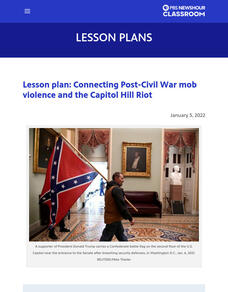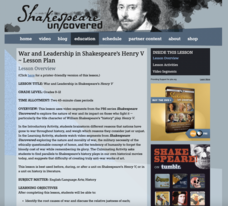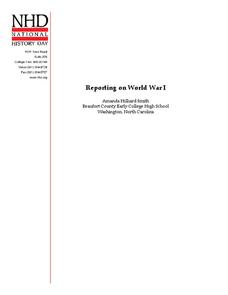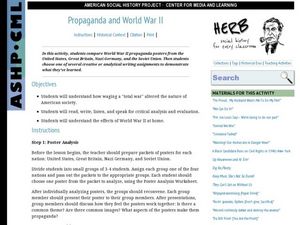Curated OER
Compare and Contrast Night to Life is Beautiful
After reading Elie Wiesel's Night, watching the movie Life is Beautiful, and researching World War II, class members write a comparison essay on the book and film. This includes a prior knowledge activity, discussion in whole and small...
Smithsonian Institution
Women's Role in the War Effort
Did you know that many women were Confederate spies during the Civil War? The resource focuses particularly on the important role women played for both the Union and Confederacy. It uses exercises such as a discussion, video, analyzing...
Smithsonian Institution
The Soldier’s Experience—Vietnam versus World War I
The Vietnam War and World War I were two very important—and different—wars. To understand the differences, and similarities, class members watch videos, examine primary source documents, and then create a newscast that examines the...
Civil War
Civil War Medicine: Fact or Fiction
Young historians compare the presentation of medical care during the Civil War in passages from fictional and nonfictional texts. They examine passages from Gone with the Wind by Margaret Mitchell and Soldier's Heart by Gary Paulsen, and...
Digital Public Library of America
Women in the Civil War
Vivandieres and cantinieres, nurses and soldiers, loyalists and unionists. A primary source set provides young historians an opportunity to investigate the many roles women played in the United States Civil War.
PBS
Connecting Post-Civil War Mob Violence and the Capitol Hill Riot
Anti-democratic violence is not new in the United States. Learners watch videos and then compare and contrast the 1873 Colfax and the 1898 Wilmington massacres. They then watch a video about the Capitol Hill insurrection of 2021 and...
National History Day
“War Is Hell. We Know it Now.” American Soldiers in the Meuse-Argonne Offensive
Understanding the soldier's experiences during World War I sometimes takes a newscast. Learners see the importance of understanding multiple points of view with a newscast project surrounding the Meuse-Argonne Offensive. Compare and...
Smithsonian Institution
The Price of Freedom: Americans at War
An interactive resource covers all of the United States' most prominent and influential historic wars including the Vietnam War, the Cold War, the War of 1812, and the Korean War. Learners observe cause and effect as well as how violence...
Curated OER
Armadillo: Reporting on War
Point of view is everything, especially when reporting about the war in Afghanistan. Class members compare and contrast the same event from the war in Afghanistan as reported by five different sources. Learners are also asked to rank the...
University of California
The Civil War: Strategies and Battles
Was it the War against Northern Aggression or the War to Unify the Union? Scholars investigate the key battles and strategies of the American Civil War to determine just why the North was victorious in the end.
Shakespeare Uncovered
War and Leadership in Shakespeare’s Henry V
“Compared to war all other forms of human endeavor shrink to insignificance.” “War is not healthy for children and other living things.” These two views of war, embodied in George Patton’s statement and Lorraine Schneider‘s famous 1966...
C3 Teachers
Uncle Tom’s Cabin: Can Words Lead to War?
"Words, words, words." Despite Hamlet's opinion, words can be significant. In this inquiry lesson, middle schoolers learn how the words in Harriet Beecher Stowe's Uncle Tom's Cabin, in the view of many, lead to the American Civil War. To...
Friends of Fort McHenry
Was the War of 1812 Our Second War of Independence?
Though it occurred almost 40 years later, could the United States have been fighting for their independence again in the War of 1812? Using appropriate primary source material from each of the two wars, compare and contrast the situation...
Smithsonian Institution
Comparing Confederate and Union Soldiers
The Civil War, a war that divided a nation. Comparing and contrasting the Confederate and Union soldiers is not always an easy task, but the eighth of 15 resources makes it easy to teach the concepts. Exercises include watching videos in...
National History Day
Reporting on World War I
Throughout history, newspapers have reported the events of the day as they unfolded. Using primary and secondary sources from World War I, scholars uncover how the American people learned of the events of the War to End All Wars. History...
Roy Rosenzweig Center for History and New Media
War and Poetry
A band of brothers or the Devil's agents? Nobel warriors freeing the oppressed or mercenaries working for the military/industrial complex? Groups examine poems from the Civil War, World War I, and World War II to determine the poets'...
San Francisco Symphony
American Civil War Songs
Learners will compare and contrast two songs from the Civil War era, one from the North and one from the South. They'll write a comparative essay on their songs, and then compare their essays and songs with others in their small groups....
Jamestown-Yorktown Foundation
How Did Relations between Britain and the Colonies Change after the French and Indian War?
What does the French and Indian War have to do with the American Revolution? Following the war, Britain issued the Proclamation of 1763 in an attempt to limit the colonists' western expansion. To understand how the proclamation, the...
Curated OER
Cold War Conflict in Vietnam: The Vietnam-Era Presidency
Comparing and evaluating various media types is a great way to build critical analysis skills. Learners read about the Vietnam era presidency, specifically the foreign policy established by Johnson and Nixon. Then they compare several...
Tennessee State Library & Archives
Vietnam War
A picture can speak 1000 words. Scholars research the Vietnam War through the lens of a camera. Examining photos from the collection of Christopher D. Ammons allows open interpretation of life during one of America's darkest conflicts....
Franklin D. Roosevelt Presidential Library & Museum
Pearl Harbor Activity #6: December 7 and September 11 - Infamy Twins?
Why did attackers on December 7, 1941, and on September 11, 2001, choose the targets they did? That is one of several questions young historians try to answer as they compare and contrast the two attacks. They also consider the...
Curated OER
Propaganda and World War II
What was the true meaning behind WWII propaganda posters? Historians analyze images from the U.S., Great Britain, Nazi Germany, and the Soviet Union, sharing findings in small groups. A poster analysis worksheet and all posters are...
Smithsonian Institution
General George Washington, Military Leader
Teach pupils the characteristics that make George Washington such an effective leader, especially in context of his time period. Scholars view artifacts, participate in group work, create lists, compare and contrast, and discuss as a...
Curated OER
I Am Freedom Bound!
Upper elementary and middle school learners engage in this awesome lesson plan on the Civil War. In it, they watch streamed video, perform Internet research, engage in hands-on activities, and use their geography skills to locate...

























